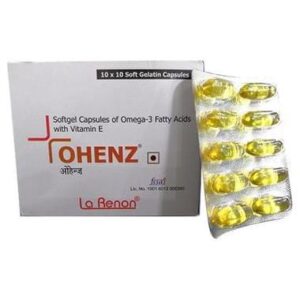VIT E + OMEGA-3 FATTY ACIDS
Vit E: Vitamin E is a fat-soluble vitamin that acts as an antioxidant in the body. It is essential for maintaining healthy cells and is found in various foods such as nuts, seeds, and vegetable oils. Vitamin E is also available as a dietary supplement.
The primary use of vitamin E is as a dietary supplement to prevent or treat vitamin E deficiency, which is rare in healthy individuals. It is also used for other conditions such as Alzheimer’s disease, cardiovascular health, and antioxidant support.
The mechanism of action of vitamin E is mainly attributed to its antioxidant properties. It helps to protect cells from damage caused by harmful molecules called free radicals. Free radicals can accelerate the aging process and contribute to the development of various diseases. By neutralizing these free radicals, vitamin E helps to maintain the integrity and function of cells.
The recommended daily dose of vitamin E varies depending on age, sex, and specific health conditions. For adults, the recommended dietary allowance (RDA) ranges from 15 to 19 milligrams (mg) per day. However, higher doses are sometimes used under medical supervision for certain conditions.
Vitamin E is generally considered safe when taken within the recommended doses. However, high doses of vitamin E supplements can increase the risk of bleeding. It can act as a blood thinner and may interfere with blood clotting. Therefore, individuals who are taking anticoagulant medications or have bleeding disorders should exercise caution and consult a healthcare professional before taking vitamin E supplements.
Other potential side effects of vitamin E, although rare, include nausea, diarrhea, stomach cramps, fatigue, and allergic reactions. It is important to note that vitamin E supplements should not be taken without medical advice, especially if an individual has specific health conditions or is taking other medications.
Overall, vitamin E is a valuable nutrient with antioxidant properties that can support overall health. However, it is always recommended to consult a healthcare professional before starting any dietary supplements to determine the appropriate dose and ensure safety.
Omega-3 Fatty Acids: Omega-3 fatty acids are a type of polyunsaturated fats that are commonly found in fatty fish, such as salmon, mackerel, and sardines, as well as in certain plant-based sources like flaxseed and chia seeds. These fatty acids are essential nutrients that play a crucial role in maintaining overall health and well-being.
The primary use of omega-3 fatty acids is to support cardiovascular health. Numerous studies have shown that these fats can reduce triglyceride levels, lower blood pressure, decrease inflammation, and improve overall heart function. They have also been found to have potential benefits for brain health, reducing the risk of cognitive decline, and improving mental health conditions such as depression and anxiety.
The mechanisms of action of omega-3 fatty acids involve their ability to modulate the body’s inflammatory response and balance the levels of certain fatty acids in the blood. Omega-3s inhibit the production of inflammatory substances, such as prostaglandins and cytokines, which can contribute to the development of cardiovascular diseases. By reducing inflammation, omega-3s help to maintain the health of blood vessels, reduce blood clots, and promote cardiovascular function.
The recommended daily dose of omega-3 fatty acids varies depending on individual needs and health conditions. However, the American Heart Association suggests a minimum daily intake of 1 gram of EPA/DHA (eicosapentaenoic acid/docosahexaenoic acid) for individuals with documented cardiovascular disease. For general health maintenance, a daily dose of 250-500 mg of EPA/DHA is often recommended.
While omega-3 fatty acids generally have a good safety profile, they can cause some side effects. Common side effects include fishy aftertaste, bad breath, indigestion, and diarrhea. Higher doses of omega-3 fatty acids may increase the risk of bleeding, so caution should be taken by individuals with bleeding disorders or those taking blood-thinning medications.
It’s important to note that omega-3 fatty acids should not be used as a substitute for medical treatment, and individuals should consult their healthcare provider before starting any new supplement.

